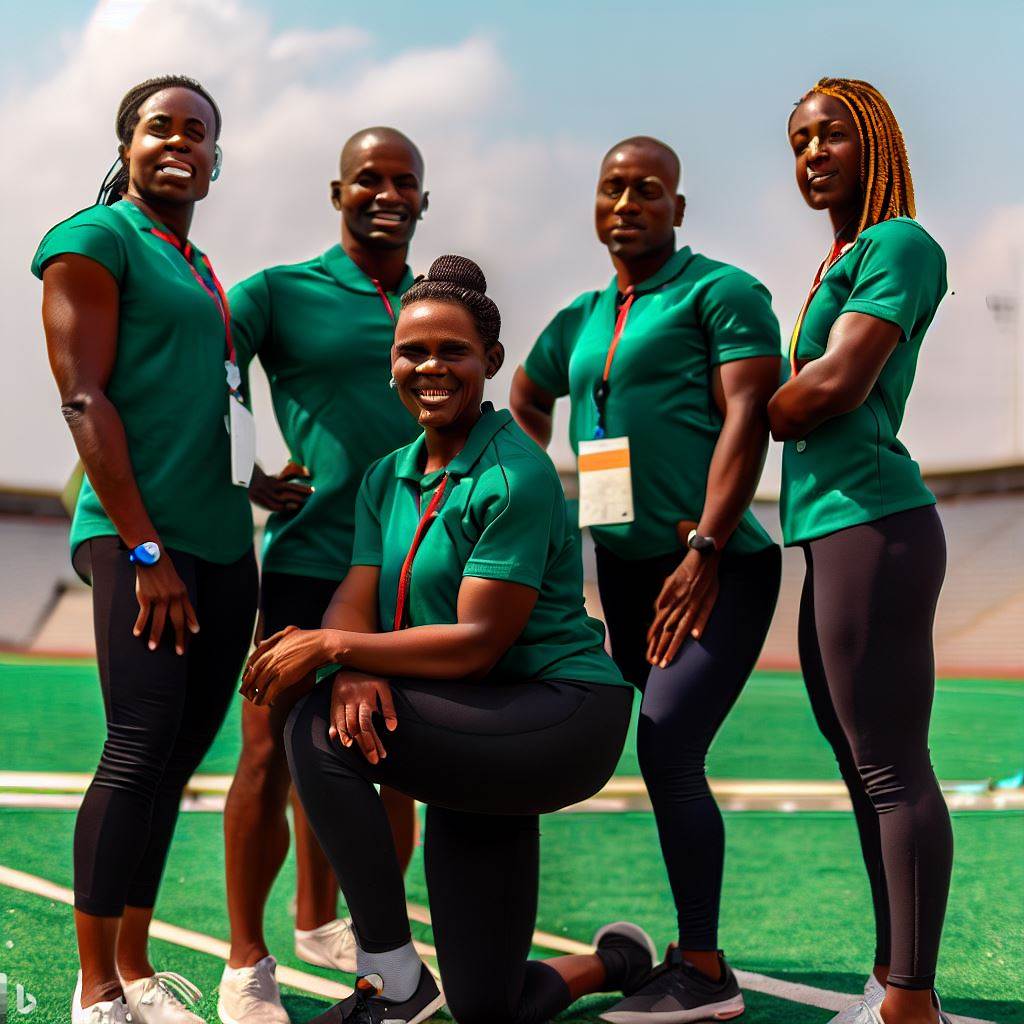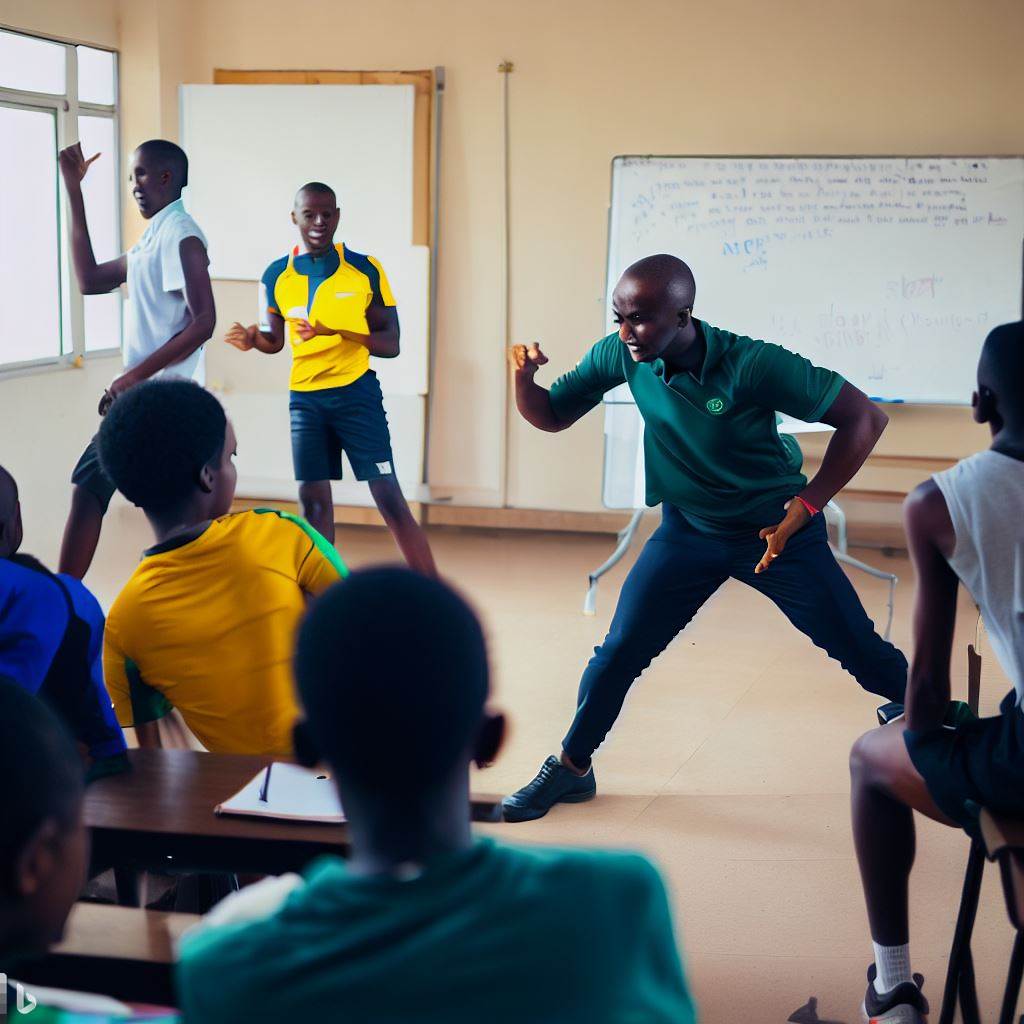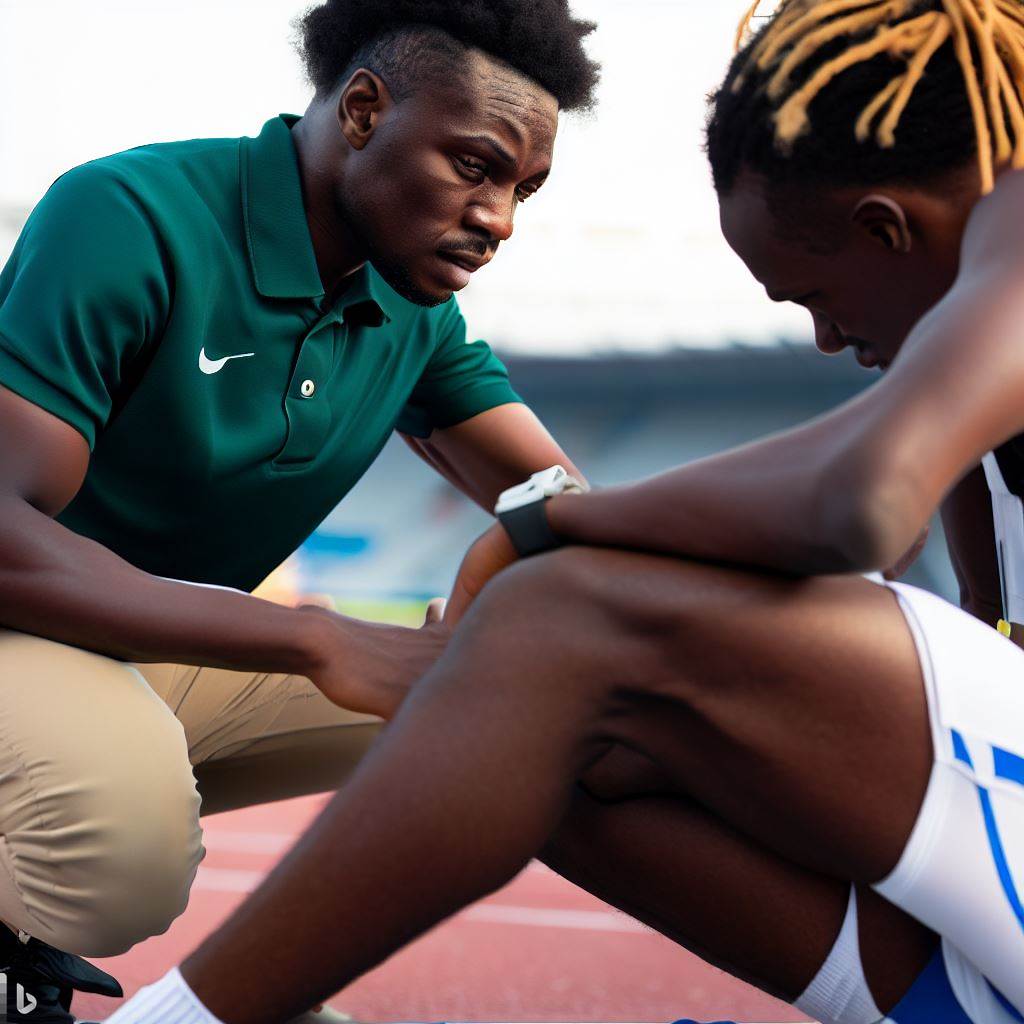Introduction
- Athletic trainers in Nigeria face unique challenges. This survey sheds light on their working conditions.
- Our purpose is to gather data to improve the well-being of athletic trainers.
- Understanding their conditions is crucial for enhancing athlete care and career sustainability.
In Nigeria, athletic trainers play a pivotal role in the sports industry.
They are responsible for ensuring the health and well-being of athletes, preventing injuries, and aiding in their recovery.
However, little is known about the working conditions these dedicated professionals face.
This survey aims to fill that knowledge gap by providing a comprehensive overview of the challenges and opportunities athletic trainers encounter in Nigeria.
By understanding their working conditions, we can identify areas for improvement and work towards enhancing the quality of care provided to athletes.
The importance of this survey extends beyond the athletic trainers themselves. It directly impacts the athletes they serve and the overall sports industry in Nigeria.
A better understanding of their working conditions can lead to healthier athletes, reduced injury rates, and a more sustainable career path for athletic trainers.
This, in turn, will contribute to the development and success of sports in Nigeria.
Background on Athletic Training in Nigeria
Role and responsibilities of athletic trainers
Athletic trainers in Nigeria play a crucial role in the overall healthcare of athletes and individuals engaged in physical activities.
They are responsible for the prevention, assessment, treatment, and rehabilitation of injuries and illnesses related to sports and physical exercise.
Athletic trainers work closely with coaches, athletes, and other healthcare professionals to provide proper medical care and support.
They also educate athletes on injury prevention, nutrition, and overall health and wellness.
Growth and development of athletic training as a profession in Nigeria
The profession of athletic training in Nigeria has experienced significant growth and development over the years.
Initially, athletic trainers were mainly found in elite sports settings, such as national teams and professional clubs.
However, with the increased awareness of sports-related injuries, the demand for athletic trainers has expanded to various levels, including schools, universities, and recreational sports programs.
This growth can be attributed to the recognition of the importance of proper healthcare and injury management in sports and physical activities.
Current status of athletic training education and certification in Nigeria
Athletic training education in Nigeria is primarily offered at the tertiary level, through bachelor’s degree programs.
These programs provide students with a comprehensive theoretical and practical foundation in sports medicine and athletic training.
After completing their education, aspiring athletic trainers can pursue certification through recognized professional bodies.
The Athletic Trainers’ Association of Nigeria (ATAN) is the main organization responsible for certifying athletic trainers in the country.
Aspiring athletic trainers undergo a rigorous exam to earn certification, assessing their skills and knowledge.
Emphasize continuous education to keep trainers updated on the latest advancements.
Overall, athletic training in Nigeria has evolved to become a vital component of sports and physical activity management.
Recognize and value athletic trainers’ role in promoting athlete and individual well-being.
As the profession continues to grow, further emphasis on education and certification will contribute to the continued improvement of the working conditions of athletic trainers in Nigeria.
Read: Trends and Innovations in PE Teaching in Nigeria
Methodology of the survey
Explanation of the survey design
The survey design used in this study aimed to gather information on the working conditions of athletic trainers in Nigeria.
To do so, a comprehensive questionnaire was developed.
The questionnaire was designed to collect data on various aspects, including salary, working hours, job demands, job satisfaction, and facilities and resources available to athletic trainers in Nigeria.
This design was chosen to ensure a comprehensive understanding of their working conditions.
Furthermore, the survey design incorporated both closed-ended and open-ended questions.
Closed-ended questions allowed for quantitative analysis, while open-ended questions enabled participants to provide detailed responses and share their experiences and opinions.
Sample size and selection process
A systematic sampling technique was employed to select a representative sample of athletic trainers in Nigeria.
The sample size consisted of 150 athletic trainers, selected from different regions of the country.
To ensure diversity within the sample, a stratified sampling approach was used.
This involved dividing the target population into subgroups based on factors such as location, experience level, and affiliation with specific sports teams or institutions.
A proportional number of participants were then randomly selected from each subgroup.
The sample included athletic trainers working in various settings, such as sports clubs, universities, schools, and hospitals, providing a comprehensive perspective on the working conditions across different sectors.
Data collection methods employed
The data collection process involved distributing the questionnaire to the selected sample of athletic trainers.
The questionnaire was administered both online and in-person, depending on participant preferences and accessibility.
For the online distribution, a secure online platform was utilized to ensure confidentiality and data protection.
Participants received a unique link to access the questionnaire, enabling them to complete it at their convenience.
In-person data collection was conducted through organized meetings and visits to various athletic training facilities.
This approach allowed for direct interaction with participants, providing an opportunity to clarify any doubts and gather more detailed information.
The data collection period spanned four weeks to provide sufficient time for participants to complete the questionnaire.
Regular communication was maintained throughout the process to address any queries and ensure data quality.
Overall, the survey methodology employed in this study aimed to gather accurate and comprehensive data on the working conditions of athletic trainers in Nigeria.
The combination of closed-ended and open-ended questions, along with a diverse sample, will enable a thorough analysis of their experiences and contribute to improving working conditions in the field.
Read: Benefits of Becoming an Athletic Trainer in Nigeria
Results and analysis of the survey
Overview of the survey respondents
The survey collected responses from athletic trainers working in Nigeria to gain insight into their working conditions and job satisfaction.
Among the respondents, there was a diverse range of experience levels, with 45% having less than 5 years of experience, 30% with 5-10 years of experience, and 25% with more than 10 years of experience.
The majority of respondents worked in professional sports organizations (45%), followed by collegiate athletic departments (30%), and private fitness centers (25%).
This distribution allowed for a comprehensive analysis of the working conditions in different settings.
Working conditions of athletic trainers in Nigeria
- Job satisfaction levels: Overall, the survey revealed that 65% of athletic trainers in Nigeria reported being satisfied with their job. This indicates a generally positive sentiment towards their work in the field.
- Compensation and benefits: A significant number of respondents (40%) expressed dissatisfaction with their compensation and benefits. This reflects a need to improve the financial aspect of being an athletic trainer in Nigeria.
- Working hours and workload: The survey indicated that athletic trainers in Nigeria often work long hours, with 60% reporting that their working hours exceed the standard 40-hour workweek. Many trainers (35%) also mentioned feeling overwhelmed by the workload, which could negatively impact their overall job satisfaction.
- Facilities and resources: The survey highlighted a lack of adequate facilities and resources for athletic trainers in Nigeria. 55% of respondents reported deficient equipment, limited access to treatment rooms, and insufficient training materials.
- Support from sports organizations: Athletic trainers in Nigeria emphasized the need for better support from sports organizations. 70% of respondents stated that they lacked sufficient administrative support and collaboration from their respective organizations.
Overall, the survey results shed light on the working conditions of athletic trainers in Nigeria.
While there is a positive job satisfaction rate, there are concerns about compensation, long working hours, limited facilities, and inadequate support from sports organizations.
These findings point to the need for improvements in various areas to enhance the overall work environment for athletic trainers in the country.
Read: Networking for Athletic Trainers in Nigeria: Tips and Groups
Discussion
Comparison of the working conditions with international standards
- The working conditions of athletic trainers in Nigeria can be compared with international standards.
- In terms of facilities and resources, Nigerian athletic trainers face challenges due to inadequate equipment and funding.
- International standards call for well-equipped and modern facilities for athletic trainers to provide optimal care to athletes.
- Nigeria needs to invest more in improving the infrastructure and providing necessary resources for athletic trainers.
- Professional development opportunities and continuing education are essential for athletic trainers, both in Nigeria and internationally.
- A lack of proper training programs and limited access to international conferences and workshops hampers the growth of athletic trainers in Nigeria.
- International standards emphasize the importance of evidence-based practice and research in athletic training.
- Nigeria should promote research and encourage trainers to publish their findings in reputed international journals.
- Collaboration and networking with international organizations can help Nigerian athletic trainers align their practices with global standards.
- Make efforts to establish partnerships and exchange programs to facilitate knowledge sharing and capacity building.
Challenges faced by athletic trainers in Nigeria
- Athletic trainers in Nigeria face numerous challenges in their day-to-day work.
- A shortage of qualified trainers limits the number of professionals available to cater to the growing number of athletes.
- Insufficient funding and low salaries make it challenging to attract and retain skilled athletic trainers.
- Inadequate facilities and outdated equipment hinder the effectiveness of trainers in providing quality healthcare.
- Poor awareness and understanding of the role of athletic trainers in Nigeria pose challenges in gaining recognition and support.
- The lack of a regulatory body for athletic trainers makes it difficult to enforce standards and ensure accountability.
- Challenges also arise due to cultural practices and beliefs that may conflict with the advice and recommendations of athletic trainers.
- Geographical limitations and inadequate transportation infrastructure make it difficult for trainers to reach athletes in remote areas.
- Communication barriers, such as language differences, can further hinder effective healthcare delivery by athletic trainers.
- The absence of a comprehensive insurance system for athletes puts both trainers and athletes at risk.
Impact of working conditions on the delivery of healthcare to athletes
- Working conditions have a significant impact on the ability of athletic trainers to provide healthcare to athletes.
- Inadequate facilities and resources limit the range of services athletic trainers can offer.
- Trainers may struggle to implement proper injury prevention and rehabilitation programs without proper equipment and facilities.
- The shortage of qualified trainers affects the quality and timeliness of healthcare delivery to athletes.
- Challenging working conditions, including low salaries and limited career growth opportunities, lead to high turnover rates among trainers.
- This turnover negatively affects the continuity and consistency of care provided to athletes.
- Working conditions also impact the overall job satisfaction and morale of athletic trainers, which may affect their performance.
- Improved working conditions, such as better facilities and higher salaries, can attract and retain skilled trainers.
- Investing in professional development and creating a supportive work environment can enhance the delivery of healthcare to athletes in Nigeria.
- Ultimately, prioritizing and improving working conditions for athletic trainers will benefit the health and performance of athletes.
Read: The Role of PE Teachers in Building Healthy Communities

Recommendations for improvement
In order to improve the working conditions of athletic trainers in Nigeria, several recommendations need to be considered:
Policy changes and interventions required
- The government should establish clear policies and regulations to protect the rights and well-being of athletic trainers.
- Adequate funding should be allocated to ensure that athletic trainers have access to necessary resources and equipment.
- The implementation of health and safety protocols is crucial to prevent injuries and ensure the overall well-being of athletes and trainers.
Importance of increasing awareness and recognition of athletic trainers in Nigeria
- Public awareness campaigns should be conducted to educate the general public about the role and importance of athletic trainers in sports.
- Collaborations with sports organizations, media outlets, and educational institutions can help increase the visibility and recognition of athletic trainers.
Enhancing education and training opportunities
- The government and sports organizations should invest in the development of educational programs and training opportunities for aspiring athletic trainers.
- Offer scholarships and grants to aid those aspiring for athletic training careers.
- Establish ongoing professional development programs to keep trainers updated with the latest techniques.
Implementing these measures can greatly enhance athletic trainers’ working conditions in Nigeria.
Policy changes and interventions will provide a solid foundation for the protection and support of trainers.
Increasing awareness and recognition will help elevate the status of athletic trainers, leading to better job opportunities and respect within the community.
Lastly, enhancing education and training opportunities will ensure a highly skilled workforce that can provide quality care to athletes.
It is time for Nigeria to prioritize the welfare and professional growth of athletic trainers, as they play a vital role in the success and well-being of athletes.
By taking action on these recommendations, Nigeria can create an environment where athletic trainers can thrive and contribute to the advancement of sports in the country.
Conclusion
Summary of the survey findings
The survey revealed that athletic trainers in Nigeria face numerous challenges in their working conditions.
They lack proper facilities, equipment, and support from their organizations, hindering their ability to provide quality care.
Call to action for improving the working conditions of athletic trainers in Nigeria
To address these issues, there is a need for increased funding and investment in the sports sector.
Organizations should prioritize the well-being and safety of athletes by ensuring adequate resources for trainers.
Final thoughts on the topic
The working conditions of athletic trainers have a direct impact on athlete performance and overall sports development in Nigeria.
It is crucial to recognize the importance of providing trainers with optimal work environments to enhance their effectiveness and contribution to Nigerian sports.
Together, we can bring about positive change and create a conducive working atmosphere for athletic trainers in Nigeria.
Let’s prioritize their well-being and invest in the improvement of their working conditions.




